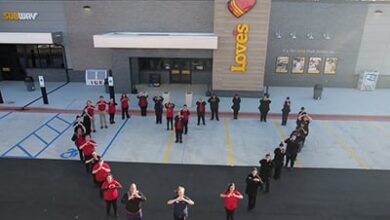Blog: How Military Skills Help a Career in Sales
 Chad Storlie
Chad StorlieChad Storlie is a retired U.S. Army Special Forces officer and current business and marketing consultant and teacher.
Sales roles are some of the most difficult and the most rewarding of any position in business. Sales roles, whether in a major corporation, a small business, a food truck vendor, or on the floor of a retail shop, require patience, skill, good nature, a deep understanding of the customer, and a daily willingness to go above and beyond to help the customer satisfy their shopping or information needs. A sales role requires you to educate, inform, negotiate, and conclude sales opportunities with a wide variety of different customers and to use different skill sets simultaneously to ensure a solution that meets both the customer’s needs and the needs of the sales organization. In short, sales roles are difficult but incredibly rewarding.
There are several military skill sets that can make a sales role more enjoyable and more successful.
Be an Expert in Your Field and Have the Latest Corporate News. In the military, a great military leader not only sets the example in their own unit, but also helps other military units succeed. A salesperson is similar to a military leader because a salesperson needs to be a positive physical representation of all that a company is and aspires to be. By no means does a salesperson have to be perfect, but they need to be an expert in their industry. A salesperson needs to understand both their company’s products and services and how they help their customers excel in daily operations. One of the greatest benefits a salesperson performs is helping their customers use the company’s products and services to deliver a better service for the customer’s customers. Another core attribute that translates from the military role to a sales role is bringing your customer’s intelligence on how to deliver better to their customers or what the customer’s competitors are doing. Expertise, industry intelligence, and dedication to the customer are common traits for both military professionalism and sales professionalism.
Be Honest, Conscientious, Respectful and Have Strong Follow Up. Naming personal qualities of a solid military leader and a sales leader are startlingly similar. We want both to be honest, respectful, conscientious and dedicated to their duty, and have a strong follow up on outstanding issues. In the military, we want our leaders to look out for our personal and professional well-being. In sales, we want a salesperson to look out for the well-being and success of their customers. There is no difference in leadership qualities between military leaders and salespeople. Each are ethical, honest, and respectful of people and the organizations that they serve.
Listen, Take Notes and Display Initiative When Seeking Solutions. The best salespeople and military leaders are often quiet. They are quiet because they are seeking to understand, take notes, listen to what their customers want, and then taking the initiative to generate ideas and options that their organizations can successfully accomplish. A poor salesperson and military leader are loud, boastful, and talk a “solution” before they even fully understand the problem that they are trying to solve. Listening is an underrated skill and a highly appreciated quality for both military and sales leaders. When someone listens, takes notes, ask questions, and then provides ideas for a solution based on what they heard, and not what they have done in the past, we know that person is there to help us find a solution, and not just to provide an “easy” answer.
Adjust and React to New Priorities Quickly. Adjusting to changes quickly is a quality that the military and salespeople both experience much too often. Priorities change due to changes in leadership, actions exhibited by competitors, changes in priorities, changes in strategies, changes in budget, other personnel changes, and different ideas what the organization needs “today.” Change happens and disrupts plans for leaders in both the military and in sales. What great military and sales leaders do is to react quickly and comprehensively to the changes and deliver another proposal quickly that meets the needs and expectations for the customer’s new strategy to be successful. Staying with the “old” plan helps no one. Delivering a new plan quickly that addresses the changes in strategy/budget/priorities helps everyone succeed.
Advocate for Your Customer to Create Loyalty. In the military and in business, loyalty is the best outcome for leaders and the led. In the military, loyalty goes “down the line” from military leaders before it comes back up. Lower ranking military personnel need to see, trust, and experience loyalty from their leaders before they provide their loyalty in return. Likewise, for a salesperson and a business, customer loyalty provides the greatest financial rewards for a business and a company. If I create loyalty in a customer, then that customer trusts my products and services and I know that I need to be an incredibly strong internal advocate for that customer in my business organization. Loyalty to those led and from/to customers are some of the best personal and business outcomes that military and sales leaders can achieve.
Live A Healthy Lifestyle and Get Home Often. Military and sales positions are highly stressful. Military and sales positions are where the front line “winning” occurs. Sales and military leaders need to promote their own exercise, sleep, healthy diets, and control their schedules as much as possible to be near family, friends, and other personal support. It is critical to remember that military units and corporations will never love you and, in fact, are designed to succeed when you leave. Maintaining a strong level of personal and mental fitness means that salespeople and military personnel will continue to have great lives when they leave their organizations and move onto other roles.
Being a successful salesperson and a military leader is difficult and stressful. Consistently acting in the best interests of both organizations while being ethical, honest, creative, and conscientious ensures a successful career as a military leader and as a sales leader.
Chad Storlie is a retired U.S. Army Special Forces officer, an Iraq combat veteran, and has 15 years university teaching experience as an adjunct professor of marketing. He is a mid-level B2B marketing executive and a widely published author on leadership, logistics, marketing business, data, decision making, military and technology topics.



